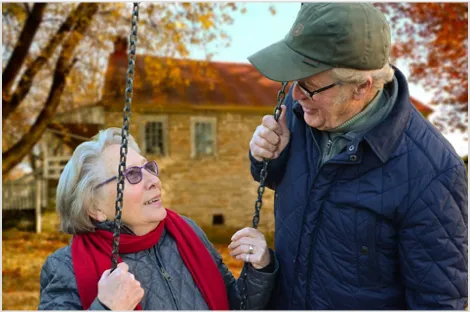
Healthy, Happy and Far Away: Advice for Long-Distance Caregivers
September 28th, 2018Alzheimer's Care, Caregiver Service, Dementia Care, Elderly Care, House Cleaning, In Home Care, Long Term Care, Senior Care Services,
If you live far away from an aging parent, you may have gone years without worrying about your father or mother getting to medical appointments, the grocery, or maintaining an active social life. However, with age may come a lack of mobility, forgetfulness, or isolation, and a once self-sufficient parent is suddenly incapable of doing all those things you’ve taken for granted. Seemingly overnight, you’ve become a long-distance caregiver with a very big job of coordinating a whole lot of needs and activities.
Now, you have to determine whether your loved one requires skilled medical care, assistance with daily activities, transportation to medical appointments, companionship, or in-home mobility modifications. It’s a lot to work out, and if the answer to one or more of these scenarios is “yes,” it’ll probably require a trip and a lot of research.
Medicare Supplement
Senior care can be very expensive. Adding a Medicare supplement plan is a good idea because it can help cover expenses that health insurance will not. Benefits may include anything from prescriptions to vision and dental care, based on the plan in which your parent is enrolled. Be aware that the Medicare open enrollment period begins October 15 and ends December 7, so the sooner you can help your parent research options, the better prepared you’ll be if the need arises.
Finding Support
This is an excellent time to enlist the aid of any friends or family members who live near your parent. If that’s not a possibility, consider introducing yourself to your parent’s neighbors in case an emergency intervention is necessary. Hopefully, the neighbors will be willing and able to help with transportation, errands, and other ad hoc needs that will likely arise. Find out as much as possible about in-home health aides, or check out the U.S. Department of Health and Human Services’ Carelike community resource finder, a free service that can help you identify services anywhere in the US (some senior care services are free and have no income requirements).
Caregiver Support Resources
Trying to carry on with so many new responsibilities can be overwhelming, especially when you live a long plane flight away. Your parent’s care needs could change at any time, so it’s important to know what to do if you have to find home care or companion services or a geriatric care manager. Do some research about local adult day cares, as well as assisted living and long-term care nursing facilities. Be prepared for the unexpected with a personal emergency response plan.
Monitoring
According to the National Institute on Aging, there are approximately 7 million long-distance caregivers in the US. If your parent has a special medical condition or is experiencing a mental or physical decline, a senior monitoring system provides the technology necessary to keep track of your parent and maintain peace of mind. Monitoring technology can keep you apprised of your parent’s health status, location, safety, and health. It can also keep medical care professionals apprised of the situation and increase response times if something goes wrong.
Emergencies
If an emergency does occur, you’ll need to have documentation that allows you to respond in a timely fashion. Also, make sure you have copies of your loved one’s medical records (don’t forget to include the names of doctors and other health care providers), proof of power of attorney, advanced medical directives, a living will, and anything you might need in case you have to travel on short notice.
If you’re a long-distance caregiver, information is a powerful asset because your parent’s care needs could change very quickly. Knowing where to turn in their community is essential because speed is of the essence when the need arises unexpectedly.
Credit: June Duncan for Polish Care Services https://polishcareservices.com

Helping Seniors During Seasonal Changes
September 17th, 2018Alzheimer's Care, Caregiver Service, Elderly Care, In Home Care, Long Term Care, Senior Care Services,
The seasonal changing is one of many challenges, seniors face as they progress in years. However caregivers, family members and community can offer support that helps gives seniors the right perspective to handle the transitions that occur four times each calendar year.
Transitioning into Winter
One of the primary effect on the elderly is the transition to winter. Some cause factors are:
• Loved ones visit and socializing becomes less frequent.
• Grandchildren have less time for grandma or grandpa, as they become more immersed in school activities.
• The weather becomes colder and more unpleasant.
• The weather creates more dangerous and stressful situations.
• Preparation and extra work is needed to keep the home safe and comfortable.
• Winter helps to trigger mood and health changes, and oftentimes exacerbates mental, health and physical conditions.
How Do We Help as the Seasons Change
Although all seasonal change may be challenging for seniors and their caregivers; the transition into winter is especially important to navigate with mindfulness and care.
Here are some of the things that can be done to assist your aging loved one to have an easier transition into the colder months of the year:
Discuss the Changes
We all know that the seasonal change is around the corner, and we all have feelings about it. Openly, discuss the seasonal change, and encourage talk about the challenges that are about to present themselves. This openness and acknowledgment can ease the transition considerably.
Help Prepare
Make sure warm clothing and extra blankets, are always around and that your loved one is prepared to handle the winter’s cold – make sure the house is insulated and winterized; create and use a checklist to ensure that nothing stands in the way of keeping the home comfortable during the winter months.
Inclusion
The winter can be a cold, lonely time, but it’s also a time when people get together more frequently to celebrate. Make sure your senior loved ones gets a chance to take part in the celebrations, too; although the weather is getting cold, the warmth of good company and celebration can make the most difficult winter days easier to endure.
More Help With the Changing Seasons
Learn more about how to help seniors through seasonal changes. Call Polish Care Services or visit https://polishcareservices.com today at 860-255-8278 for your FREE consultation!

A Caregiver’s Guide To Helping Seniors Find A New Home
February 18th, 2018Companion Caregiver, In Home Care, Uncategorized,
As people get older, that big family house may not work anymore. Many seniors have trouble dealing with all the empty space in that house, nevermind keeping it clean and maintained. Then there’s the financial situation. Even if the mortgage is paid off, there are still taxes owed on rooms that may not be used anymore.
As a caregiver to seniors, you can help them find a new home when the time comes. From helping on moving day to making needed renovations, there’s a lot you can do. To begin, you need to look into different housing options for the seniors.
Finding The Right House
It’s not like housing has changed a lot since the seniors bought their house, but their lives are different now. They don’t have kids to house, and as they get older, mobility and safety can become problems for them. That’s why you need to help them explore their housing options.
LoveToKnow.com lists three popular housing options for seniors: Condos, townhomes, and senior communities. While single-family homes are always an option, smaller homes are usually better. There’s less space to keep clean and have trouble with.
When picking a place, be sure to look at the local amenities. For example, a senior community can provide social experiences and even medical support when needed. Besides that, the new place should have senior-friendly door handles, shallow steps, and proper lighting.
A Smooth Moving Day
Once you’ve helped the seniors find a great place to move into, then comes the hard part: The actual moving. Packing and transporting everything can be both physically and emotionally exhausting.
To help make this day go more smoothly, A Place For Mom recommends that you help sort and organize their belongings. Treasured keepsakes can be packed but donate anything that hasn’t been used in a while. There’s no reason to move that VCR or exercise bike if they’re just collecting dust. A yard sale would also be a great idea here.
As you declutter the seniors’ old home, start packing early. Waiting for the last weekend before the move will just increase everyone’s stress and lead to mistakes. Instead, help the seniors pack a little bit at a time.
Making Needed Renovations
The point of finding a new place and packing up the old one is to help the seniors. But what if you cannot find the perfect home? You can still help the elders move there by planning some home improvements.
The New York Times reports that an easy but important addition is the grab bar. These can be installed in the bathroom, bedroom, or anywhere the seniors might need a little help getting up. In addition, seniors often have problems with vision and balance as they grow older. That means adding some new lighting, painting high-contrast colors, and even taping down rugs can all help the seniors be safer in their new home.
Kitchens are another place where seniors might need some help. According to HomeAdvisor, the average price of a a major kitchen remodel is approximately $22,000, though smaller renovations may be under $5,000. However, the benefits can be tremendous — and it can help protect seniors from accidents and injuries.
They Deserve The Help
As a caregiver, there are ways you can help seniors find a new home. Start by exploring new housing options, and help them declutter before moving day. With some remodeling and renovations, you can turn almost any home into one perfect for seniors.
Credit: June Duncan for Polish Care Services https://polishcareservices.com
